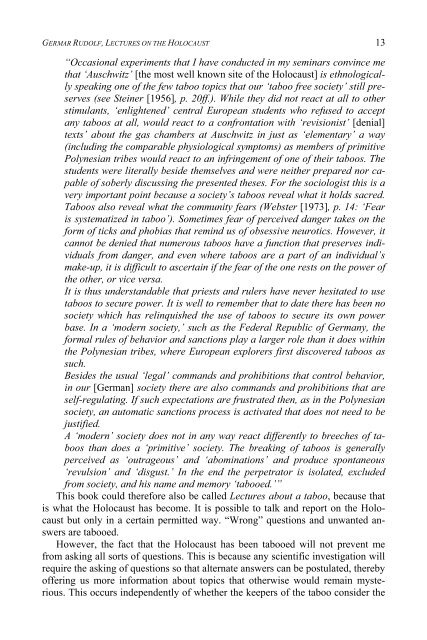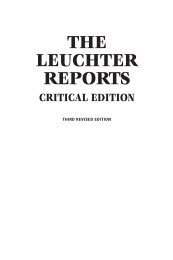15-loth-intro.pdf - The Barnes Review
15-loth-intro.pdf - The Barnes Review
15-loth-intro.pdf - The Barnes Review
- No tags were found...
Create successful ePaper yourself
Turn your PDF publications into a flip-book with our unique Google optimized e-Paper software.
GERMAR RUDOLF, LECTURES ON THE HOLOCAUST 13“Occasional experiments that I have conducted in my seminars convince methat ‘Auschwitz’ [the most well known site of the Holocaust] is ethnologicallyspeaking one of the few taboo topics that our ‘taboo free society’ still preserves(see Steiner [1956], p. 20ff.). While they did not react at all to otherstimulants, ‘enlightened’ central European students who refused to acceptany taboos at all, would react to a confrontation with ‘revisionist’ [denial]texts’ about the gas chambers at Auschwitz in just as ‘elementary’ a way(including the comparable physiological symptoms) as members of primitivePolynesian tribes would react to an infringement of one of their taboos. <strong>The</strong>students were literally beside themselves and were neither prepared nor capableof soberly discussing the presented theses. For the sociologist this is avery important point because a society’s taboos reveal what it holds sacred.Taboos also reveal what the community fears (Webster [1973], p. 14: ‘Fearis systematized in taboo’). Sometimes fear of perceived danger takes on theform of ticks and phobias that remind us of obsessive neurotics. However, itcannot be denied that numerous taboos have a function that preserves individualsfrom danger, and even where taboos are a part of an individual’smake-up, it is difficult to ascertain if the fear of the one rests on the power ofthe other, or vice versa.It is thus understandable that priests and rulers have never hesitated to usetaboos to secure power. It is well to remember that to date there has been nosociety which has relinquished the use of taboos to secure its own powerbase. In a ‘modern society,’ such as the Federal Republic of Germany, theformal rules of behavior and sanctions play a larger role than it does withinthe Polynesian tribes, where European explorers first discovered taboos assuch.Besides the usual ‘legal’ commands and prohibitions that control behavior,in our [German] society there are also commands and prohibitions that areself-regulating. If such expectations are frustrated then, as in the Polynesiansociety, an automatic sanctions process is activated that does not need to bejustified.A ‘modern’ society does not in any way react differently to breeches of taboosthan does a ‘primitive’ society. <strong>The</strong> breaking of taboos is generallyperceived as ‘outrageous’ and ‘abominations’ and produce spontaneous‘revulsion’ and ‘disgust.’ In the end the perpetrator is isolated, excludedfrom society, and his name and memory ‘tabooed.’”This book could therefore also be called Lectures about a taboo, because thatis what the Holocaust has become. It is possible to talk and report on the Holocaustbut only in a certain permitted way. “Wrong” questions and unwanted answersare tabooed.However, the fact that the Holocaust has been tabooed will not prevent mefrom asking all sorts of questions. This is because any scientific investigation willrequire the asking of questions so that alternate answers can be postulated, therebyoffering us more information about topics that otherwise would remain mysterious.This occurs independently of whether the keepers of the taboo consider the
















